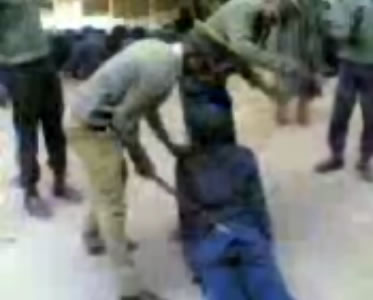On Monday, the front page story on the state controlled Zimbabwe Herald newspaper announced: National healing begins. The article quoted from Vice President Joyce Mujuru’s address at a (belated!) International Women’s Day event in Bindura. Apparently, Mujuru said that a national healing taskforce, set up by the government, “is going to ensure that all our grievances are addressed to the satisfaction of the involved parties. The national healing programme is coming down to the grassroots and will leave no stone unturned in handling every grievance.”
Something about this statement left me uneasy. Maybe it is the top down approach that government seems to be taking regarding “national healing.” I do think some kind of national reconciliation process might be an important part of resolving some of Zimbabwe’s national scars. But for this process to be truly meaningful and effective, I think ordinary Zimbabweans need first to be involved in agreeing on what this process should look like. What are the objectives? Will there be prosecution or just discussion? Is there some kind of process for restorative measure, or is it just a space to air testimonials? How will those who testify be protected from future retaliation?
Also worrying about Mujuru’s remarks at Bindura was the dismissive way in which she spoke about violence on the ground. “Do not waste time fighting each other,” she told the crowd. “We, your leaders, would be drinking coffee together. President Mugabe mooted the idea of the inclusive Government after realising the enemy was infiltrating us and taking advantage of our political differences. Come and see us at Parliament, we will be drinking and eating together across the political divide.”
This wilful rewriting of history – and the deliberate distancing of top political leaders from violence carried out on their behalf by those much farther down the political tree – is deeply worrying. How genuine can a proposed government healing process be if political leaders are not willing to take responsibility for their role in encouraging violence?
A recent Institute for Security Studies article by Max du Plessis and Joloyn Ford outlines and articulate several reasons both for and against a truth and reconciliation process for Zimbabwe. One reason against a Zimbabwean TRC is that “social forgetting” is a valid strategy for processing grievances. In Sierra Leone, for example, the ordinary citizenry, “who were tired, afraid and too well acquainted with ‘the truth’ of the violence,” preferred to “forgive and forget.” Other reasons not to engage in an organised national healing process include a desire to leave the past behind, potential of the process to be a source of conflict, that it would be a waste of scarce and precious resources, and that there is a cynicism associated with reconciliation that is seen as to strictly political.
However, the authors write, “most experience in other societies points the other way, especially when there are concerns about who gets to decide what is ‘forgotten.’ The passive response to Rhodesian-era abuses has left many legacies sill affecting Zimbabwe today, including a culture of impunity. Other reasons for a TRC include the symbolic closure of a violent chapter of Zimbabwe’s history, creating a forum for forgiveness, and a desire to channel tensions into more constructive outlets.
Importantly the paper asks: “Where will Zimbabewans place themselves in relation to politics and principles of justice in the current interim phase – and who gets to decide for Zimbabweans on these issues?”
Worryingly, in light of documented reports of ongoing political violence in Domboshawa, Chilimanzi, Cahsel, Marondera, Masvingo, Mberengwa, Mudzi, Mutoko, Muzarabani, Odzi and Shamva, it may be too soon to think about a TRC for Zimbabwe’s poltical violence since 2000. In the past two months, 27 farms have been invaded, displacing 3310 farm workers and their families. While violence continues, an arbitrary “end” date, like the swearing in of the interim government, might leave many important current cases unresolved. Surely it is too soon to begin a TRC whilst violence is still occurring? What about fears of retaliatory attacks against those who testify, if peace has not yet been achieved on the ground?
Zimbabweans deserve the respect of substance, not patronising political posturing. We need a real end to the violence, actual peace, and genuine healing.










